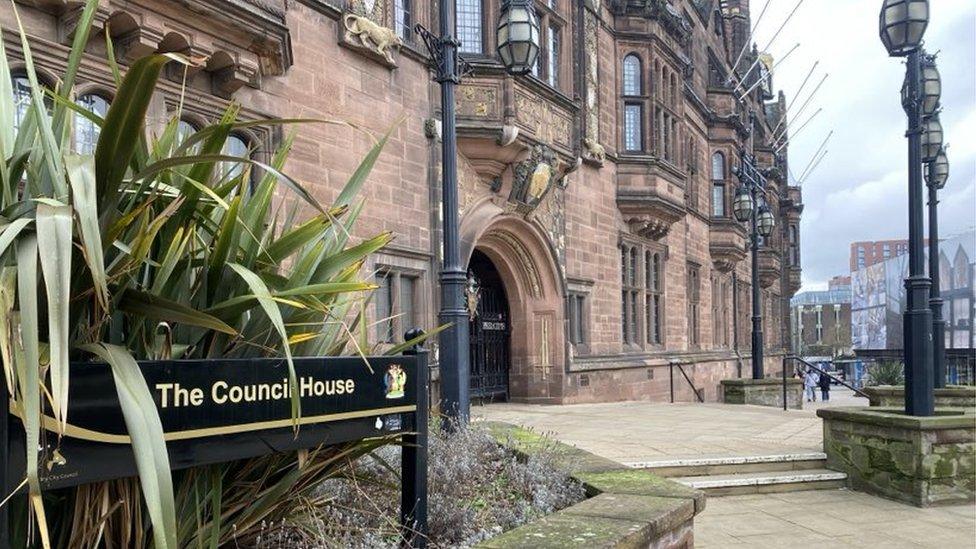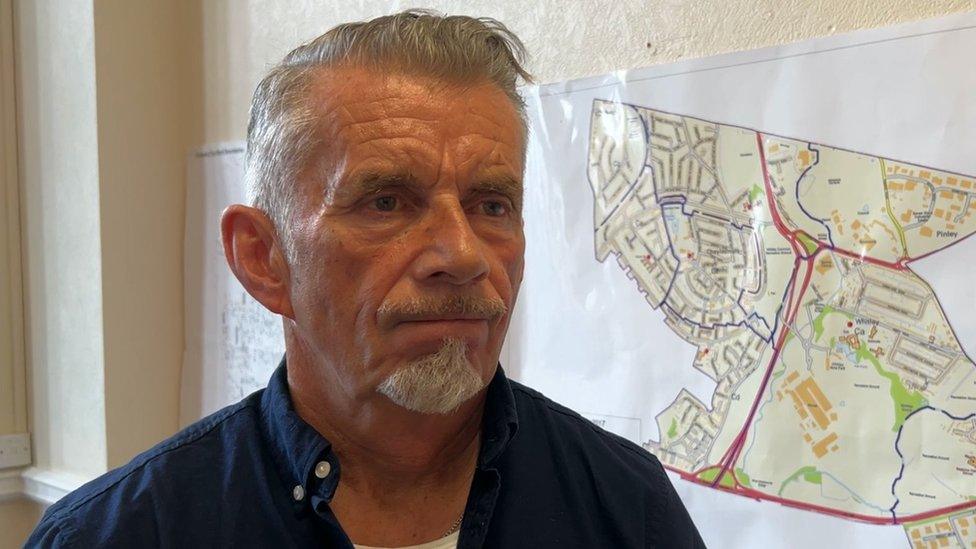Coventry and Warwickshire council cuts: What do they mean for me?
- Published

Coventry City Council has said it faces big budget shortfalls in the coming years
Coventry's city council and Warwickshire's county council have said they need to slash spending by millions of pounds to balance their books.
The Coventry authority said a £30m budget gap could put it at risk of effectively going bankrupt next year.
At county level, there is an aim to make cuts worth £64m within the next five years.
Both councils have presented their budgets for 2024/25.
The following outlines what those plans mean for taxpayers.
Why are councils in financial trouble?
Firstly, it is worth noting that a growing number of councils across the country have warned of financial stress in recent years.
Labour-run Coventry City Council has blamed its "financial crisis" on years of under-funding by central government, high demand for services and rising costs.
Richard Brown, the cabinet member for finance, said closing the council's budget gap was a "significant challenge for us" after "14 years of austerity".
But some of the council's investments - including a written-off £1m loan to the Coventry City of Culture Trust - haven't helped its financial position.
Warwickshire County Council has similar challenges.
The Conservative-controlled authority has said it is "continuing to face sharp and unsustainable increases in demand and costs across our children's and adult social care services, education and home-to-school transport".
Its deputy leader, Peter Butlin, said "local government faces unprecedented financial pressures".
What services could be cut?
Coventry City Council is planning to make £8.4m in cuts, external to services in 2024/25.
There are plans to switch off 70% of overnight street lighting, increase parking charges in the city centre, and charge £40 a year for the collection of garden waste.
Funding is being pulled for five home-to-school bus routes, and travel support for children with special educational needs and disabilities (SEND) is being reviewed.
However, Godiva Festival will go ahead as planned this year as the council seeks private investment, and three hours of free parking at War Memorial Park will remain.
Councillors are due to vote on the budget on 20 February, and given Labour's majority on the council, it is expected to be approved.

Coventry City Council's funding for Godiva Festival could be withdrawn
In Warwickshire, the county council is trying to deliver £16.2m in service savings.
The biggest reductions will impact social care, as the council seeks to rein in spending on housing support for older people and children in care.
One big area is home-to-school transport for children receiving SEND support, with the council looking to streamline the service where it can to save £3m by 2029.
But in its budget, the authority has said it wants to "invest £8.9m in home-to-school transport to ensure we continue to provide services".
But many of the cuts that were pencilled in for later years - including reducing the number of children and family centres, closing three household waste centres and making cutbacks on street lighting - have been scrapped.
Councillors on the county council approved the budget, external in a vote on 8 February.
Will council tax increase?
Both councils have announced a hike of 4.99%, the maximum allowed without holding a public vote.
In Coventry, this would add £95 a year to the bills of Band D households, pushing the annual cost above £2,000.
In Warwickshire, the amount paid is complicated by the fact there are five district and borough councils where rates of the tax differ.
They all collect a share of the tax on behalf of Warwickshire County Council. A 4.99% increase would see the county council get £1,735 - £82 more a year - from Band D homes.
What is the government doing?
In December, the government said it would make £64bn available for councils from April, stating the move represented an average increase of 6.5% compared to the year before.
Council leaders and MPs pushed for more, and in January, the government announced it would make an extra £600m available.
The government said this meant councils would receive an increase of 7.5% in cash terms on last year.
"Councils are ultimately responsible for their own finances, but we remain ready to talk to any concerned about its financial position," a government spokesperson said.
What happens if councils can't pay their bills?
Coventry City Council has suggested it may need to issue what is known as a section 114 notice.
These are triggered when a council believes it cannot meet its legal duty to ensure spending doesn't exceed income in a financial year.
This used to be a "nuclear option" but is becoming more common.
But Mr Butlin said the chances of Warwickshire County Council issuing a section 114 were "virtually nil" because its finances were sustainable.

Follow BBC West Midlands on Facebook, external, X, external and Instagram, external. Send your story ideas to: newsonline.westmidlands@bbc.co.uk, external
Related topics
- Published3 October 2023

- Published7 December 2023

- Published4 December 2023
